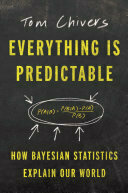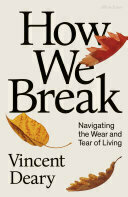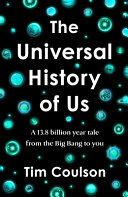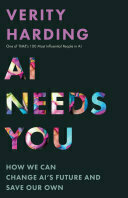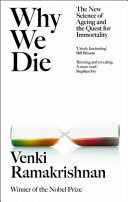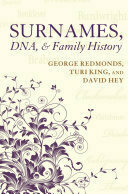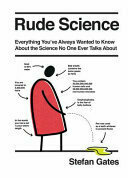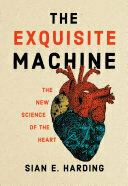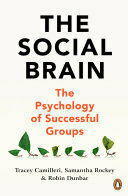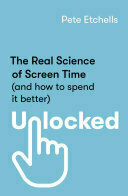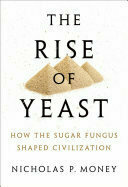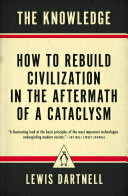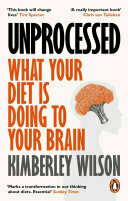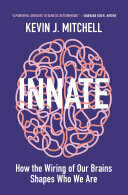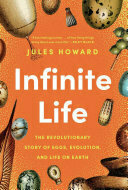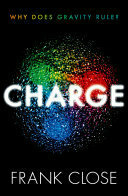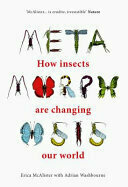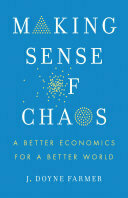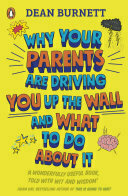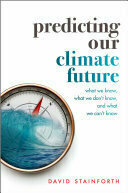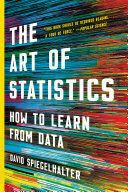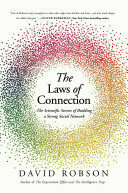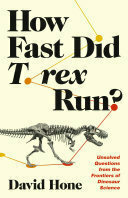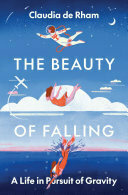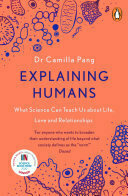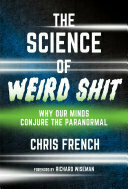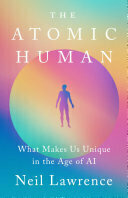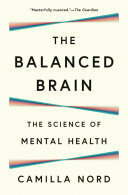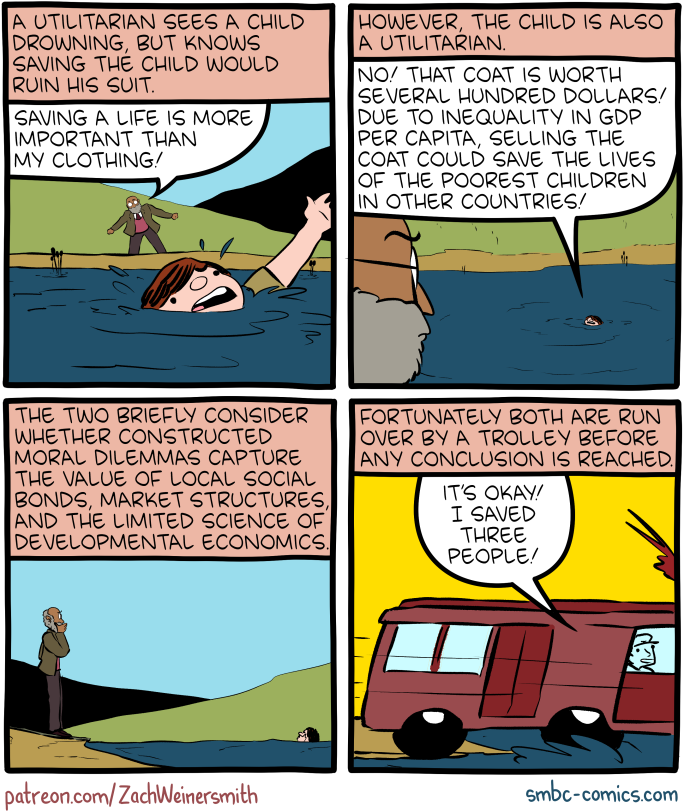Recently I read:
The left is missing out on AI: ‘…ceding debate about a threat and opportunity to the right.’
In 1984, An Unemployed Ice Cream Truck Driver Memorized A Game Show’s Secret Winning Formula. He Then Went On The Show: …and became rich, for a while.
New Scientist Live show 2024 books list
Inevitably after attending any type of show that features something even vaguely sciencey the list of books that I simply must read expands.
Here, as a service to anyone else similarly afflicted, is a list of books from as many of the speakers from the recent New Scientist Live show as I could quickly find.
The organisation of the show is such that you can’t possibly attend more than a few of the talks whilst you’re there, but that’s no reason to let unread books from people you could in theory have listened to pile up on one’s shelf of course.
Many of these distinguished folk have written several books. In those cases I picked a single one based on either which title it seemed they were implicitly or explicitly sales-pitching the most in their talk, or if not applicable, then perhaps their most recent or, just the one that caught my eye.
TIL: Thanks to the innate lack of privacy that the technology has, whilst we might not know who “Satoshi Nakamoto”, inventor of Bitcoin, actually is, people do believe that he has enough of it - between 750k and 1.1 million coins - to be worth somewhere between 50 and 75 billion dollars today.
In 2021 that made him - if it is a single person and one that goes by ‘he’ - the 15th richest person in the world.
(h/t episode 616 of Core Intuition)
Added a few more books to my absolutely unrealistic “Books about AI I want to read” list.

It is a battle evident in the psyche of many partnered people, and especially so in midlife. It shows itself, even within a happy long-term relationship, in the crystal-clear desire to be left alone.
To be allowed to work undisturbed, to perhaps write or paint or just sit at the computer, to think or nap or to choose to spend a day as one requires. To let things live where one has left them; to visit friends alone without guilt; to be who one is, without that being a daily source of irritation to someone else.
Derren Brown, from A Book of Secrets.
This quote doesn’t seem to resonate with absolutely everyone, but does in seemingly plenty of folk. There can surely be a unique kind of freedom, and certainly peace, in solitude.
Ken Follett's Fall of Giants tells fictional-but-realistic stories of family life in the early twentieth century
📚 Finished listening to Fall of Giants by Ken Follett.
This is the first book of Ken Follet’s “Century Trilogy” which sets out to allow the reader to follow the stories of five families through the highs and lows of the twentieth-century. This one covers the start of the century, up to and including the immediate aftermath of the First World War.
Amongst various other socio-cultural changes there’s big political change in the air, from the Russian revolution, to demands for women’s rights - including the British campaign for the right to vote, for workers rights and more. The “fallen giants” include the aristocracy, the royalty and perhaps even a couple of nations, at least in terms of how people thought about them at the start of the century.
Whilst primarily a work of fiction telling a made-up story of families that didn’t exist, we do see some historical figures pop their heads up. Several are from the political class, inculding Lloyd George, Woodrow Wilson, Vladimir Lenin and, inevitably, Adolf Hitler.
Supposedly Follet has made every effort when it comes to the actually-real folk to ensure that the events they’re involved in either did happen or could realistically have happened. What they say, how they behave, where they are are all intended to be plausible. Personally, this feels usefully educational to my limited knowledge of early twentieth century history, but there’s also a risk of course that I’ll mix up fiction with reality in my mind, although the danger feels less acute than with The Crown.
The five families represent folk from across the class spectrum. One of the major themes is the struggle of the working class to achieve liberation, whether via politics or other methods. We start off with Billy Williams, a child, who’s sent off to work down a Welsh coal mine. Next up we sight the aristocracy, Earl Fitzherbert, who owns the said mine amongst other lands. His sister inadvertently falls in love with a German man, which is to prove problematic given the rise of Hitler and the consequent looming conflict. Over in Russia, two orphans struggle against poverty in very different ways, orphans in part because the Russian aristocracy executed their father.
Throughout, we see how these families live, meet and mix in ways both predictable and not, as they thrive, struggle, rise and fall through a seemingly quite realistic replica of our twentieth century.
Sure, the written form of the book is apparently nearly 1000 pages long, which is something that I’d usually find tremendously off-putting. And I can sometimes find historical fiction somewhat dry. But not in this case; it proved fairly gripping as I happily listened to the 30-and-a-half hour long audio edition at a more rapid rate than I usually manage to listen to audiobooks. And in the end, the next two books in the trilogy, Winter of the World (apparently mostly covering the 1933-1949 period) and Edge of Eternity (1969-1989) have surely made it to my want-to-read list.

Ryan Broderick succinctly sums up why the contemporary mega-hype around AI doesn’t depend on the systems we have being all that good, let alone ‘superintelligent’.
…the so-called AI boom we’re in right now is really selling two things, neither of which have to be very good.
A way to automate work you don’t value enough to hire a human being to do or, at the bare minimum, a way to hide the human beings doing that work so you can feel better about how little you pay them.
After all, the only person that the hype merchants really needs to convince is your boss.
New Scientist Live talks 2024
Journeying back from the ever-fascinating New Scientist Live show, 2024 edition.
A list of the talks I managed to get to in person:
- Weird science: An introduction to anomalistic psychology, by Christopher French.
- A life of crime? By Anne Coxon.
- Our accidental universe, by Chris Lintott.
- Generation pup: The science behind the UK’s pooches, by Rachel Casey.
- The balanced brain: The science of mental health.
- The atomic human, by Neil Lawrence.
- How we break: Navigating the wear and tear of living, by Vincent Deary.
- The human-fungal symbiosis, by Nicholas Money.
More words coming on some of these in the future quite likely.
Unfortunately I was compelled to miss last year’s sci-fest, but here’s the equivalent post from 2022.
I’m curious about precisely what level of surveillance technology is powering this (admittedly useful) public toilet info sign.

Hoping Meta isn’t somehow linking me to my…biological requirements.
Busting ghosts for breakfast.

Well this is one of the more aggravating CAPTCHAs I’ve had to solve. Especially as 2/3 of the time it was the last of the twelve images of dice that was the correct one.

A disappointing selection for the next Conservative leader
Looks like the next UK Conservative leader stands a good chance of being a right-wing weirdo.
Following a surprise outcome of the leadership election, the two prospects MPs are putting to party members are Kemi Badenoch and Robert Jenrick. That’s a shame.
The desire from Cleverly to see his party getting to be a bit less weird - perhaps in reference to a current attack line against the US Republicans - seems to have failed:
During the party’s conference in Birmingham last week, Cleverly had urged party members to be “more normal”
The same kind of subject was echoed by Nadine Dorries in one of her rare good opinions:
Nadine Dorries, the Tory former cabinet minister, said on X: “MPs had one job. To be normal and vote for the person who is best placed to lead you. It really wasn’t hard.”
That said, some in Labour are apparently excited at the prospect:
In a jokey reference to the government’s donations row, a Labour MP asked: “Does Tory leadership result need to be declared as a gift?”
Google's creators envisaged that advertising-funded search engines are a bad idea (but made one anyway)
May we never forget that back in the early days, before Google decided to not not be evil, its founders were very well aware of the perils of what later came to be the funding model behind their own search engine.
The classic citation for this is Brin and Page’s 1998 paper “The Anatomy of a Large-Scale Hypertextual Web Search Engine” wherein they write that:
…we expect that advertising funded search engines will be inherently biased towards the advertisers and away from the needs of the consumers. Since it is very difficult even for experts to evaluate search engines, search engine bias is particularly insidious.
…
Furthermore, advertising income often provides an incentive to provide poor quality search results.
…
In general, it could be argued from the consumer point of view that the better the search engine is, the fewer advertisements will be needed for the consumer to find what they want. This of course erodes the advertising supported business model of the existing search engines.
…
But we believe the issue of advertising causes enough mixed incentives that it is crucial to have a competitive search engine that is transparent and in the academic realm.
That paper’s authors, Sergey Brin and Larry Page, are of course the founders of Google.
Their written conclusions sound perfectly plausible to me. They’re certainly logical. But, words are just words, and all these years later, does the product they mention as being “crucial” exist? It’s certainly not their own product, Google Search, which today operates along precisely the opposite lines. If that crucial product is one out there, it certainly isn’t very mainstream.
To be clear, there certainly do exist today search engines that aren’t funded by advertisers. But the ones I personally know of are still very much commercial, plus have pretty negligible shares of the search market.
Kagi is one such example. They make their money via users paying them between $5 and $25 per month for a subscription directly, rather than by taking payments for advertising bundled in with the revenue associated with subtle expropriation of each user’s behavioural data. This of course changes the incentives for the creators of the search engine, probably in a very beneficial way for the most part. But it also limits its audience to people who can both afford a subscription and are willing to pay for such a thing.
TIL: Until the 1948 Representation of the People Act, graduates of certain universities in the UK were permitted to vote twice in our general elections.
Once for wherever they lived, as everyone else was entitled to do - but they also got another vote corresponding to a metaphorical “university constituency” derived from the graduates of the given university.
'The Age of Surveillance Capitalism' explains why Big Tech does what it does, and why it's dangerous
📚 Finished reading The Age of Surveillance Capitalism by Shoshana Zuboff.
I’ve had this book on my top priority reading list ever since it came out in 2018. It still somehow took me five years to get to it. But I’m glad I did - I wasn’t at all disappointed with my belated reading of it. I’ve come away thinking that something along these lines should be essential reading for almost everyone who has to navigate today’s technological society.
This particular book is rather wordy and academic-sounding. Its style might not be accessible or interesting to everyone trying to make their way through today’s chaotic and busy world. There’s plenty of room for someone to bring out a shorter and simpler version. Or to communicate its message via a different media. The Netflix documentary on Facebook - “The Social Dilemma” - contained a small subset of similar ideas for instance and was surely a lot more accessible to a lot more people. But also, necessarily, that much shallower. This book is for anyone who is interested in digging deeper into what’s happening, why, and why it matters.
In any case, I feel that the ideas within this book very important to understand if you want to know what’s being done to you and why, each time you use the internet. Or, for that matter, an increasing amount of the time when you aren’t aware that you’re anywhere near the internet.
To be honest, I think you’d get a decent summary from reading just the introduction if the full thing is too heavy going.
As a disclaimer, I’ll note that the content plays heavily into my pre-existing biases as to the perils of big tech, particularly the mainstream social media companies. So perhaps some of my enthusiasm comes from the comfortable feeling one gets when reading something you already heavily agree with in many ways. But whilst one might fairly accuse it of over-hyping the current impact of surveillance capitalism I do think many of the basic ideas, the theories behind the system, are fairly indisputable and critical to document and publicise. It’s important to know what the surveillance capitalists want to do to us and why - even if you don’t believe they’re actually all that effective at doing it just yet. They’re unlikely to get any worse at what they do over time, unless we intervene.
Anyway, the general premise is that, as we know capitalism changes and adapts over time. The current version we’re heavily enmeshed within can be described as the titular “surveillance capitalism”.
Living in an the era of surveillance capitalism, the digital realm has permeated very heavily into our lives. It has redefined how things work and what things are acceptable far faster than we’ve had a chance to think about whether these changes are desirable or not. Famously, the big tech companies like to “move fast and break things”.
This is of course a problem if the “things” they are breaking include you as an individual and society as a whole. Without a swift re-evaluation and consequent serious action, Zuboff claims that our emerging “information civilisation” poses a substantial threat to some of our most fundamental rights.
The mechanism by which this plays out can be swiftly summarised via this quote:
…our lives are unilaterally rendered as data, expropriated, and repurposed in new forms of social control, all of it in the service of others’ interests and in the absence of our awareness or means of combat.
Digging deeper here - but not nearly as deep as the book does - the underlying philosophy starts with the claim by surveillance capitalists that they have the right to surveil and ingest our human experience in service of converting it into behavioural data.
Some of this data might be used to improve the products they sell. This is perhaps fair enough, maybe even a net positive for us, and is how things used to work. But ever since Google discovered how profitable this data can be in the marketplace, the rest of our surveilled and datafied human experience is translated into a “behavioural surplus”, to be used exclusively in the interests of the company who snaffled it up in the first place.
The companies concerned then use machine intelligence processes to manufacture a “prediction product” from our behavioural data. The prediction product aims, on the basis of knowing what you’re doing, thinking or feeling right now, to be able to predict what you’ll do in the future.
These prediction products are traded in an entirely separate and new marketplace - the “behavioural futures market”. Selling this information about what we’ve done, what we’re doing and what we’ll do in the future is extremely profitable for the companies that extracted it.
The author reports that it was Google that first discovered the economic value in this. Soon afterwards Facebook, Amazon, Microsoft, and the rest of big tech followed. It’s now become the default way that companies offering online services are funded now, everything from tiny start ups to mega corporations. Consequently, if we want to lead an effective life, we often have no reasonable alternative but to participate, to allow this to be done to us.
The accuracy of the predictions the companies make about us is what makes them valuable. Increased accuracy means increased profits, for which the drive is, naturally under capitalism, insatiable. Thus these companies feel compelled to acquire and infer more and more data about us, which now includes our voices, our emotions and our personalities.
Harrowing as that might be, it’s not where the danger ends. There was a realisation that the most accurate predictive behavioural data is that which is created when the organisations concerned directly alter our behaviour. If they intervene, nudging us to make decisions in line with their interests, then their predictions become more accurate and hence more profitable. Think of how the fun Pokémon Go game ended up sending us to locations that just happened to correspond to restaurants that paid them or how Facebook expropriates a huge amount of data from us and our friends in order to allow its advertisers to more effectively influence us to buy their products.
In doing this, these companies are exercising “instrumentarian power”; a power that knows and shapes human behaviour towards other people’s goals. The end goal is effectively to automate us. Whilst an earlier time’s industrial society was imagined as a well-functioning machine, instrumentarian society can be imagined as a human simulation of a machine learning system.
Instead of the typical assurances that machines can be designed to be more like human beings and therefore less threatening, Schmidt and Thrun argue just the opposite: it is necessary for people to become more machine-like.
The original digital dream - that being digitally connected is intrinsically pro-social, inclusive and tends towards the democratisation of knowledge is dead. Capitalism no longer feeds solely on human labour, but has expanded to feed on every aspect of the human experience.
How was this allowed to happen? Basically because few people understood what was going on. “Cyberspace”, where it all began, was an uncharted and fairly lawless territory. Google et al. carried out deliberately secretive and misleading activities that were anyway so new, complex and illegible to the vast majority of us that even if we’d somehow known what they were up to we wouldn’t necessarily have realised its implications.
And all this was sold to us as a freedom, as an emancipation. Who wouldn’t want free access to the entire world’s information? Who doesn’t desire to connect to their friends upon demand at the click of a button? Who would hate having the ability to publicise their thoughts, worries and concerns to the world at large? Who doesn’t want a digital assistant or convenient online tools to help them get through the struggles and torments of modern life?
At last, herald true personalisation is here to soothe us. Someone - well, something - that recognises us for who were are, acknowledges our interests, never says no, is always available.
But, inevitably, behind the scenes, solving these issues is not the primary purpose that these products were created.
Surveillance capitalists quickly realized that they could do anything they wanted, and they did. They dressed in the fashions of advocacy and emancipation, appealing to and exploiting contemporary anxieties, while the real action was hidden offstage.
To Facebook et al. we are not customers. There’s no economic exchange, price or profit directly taking place between us and Google when we do a web search. Contra to a commonly held idea, we are not even the product. We are merely the source of the raw material that the surveillance capitalists need, the behavioural surplus. The real customers of these companies are the organisations that buy our data from them in the behavioural futures markets.
…individuals are definitively cast as the means to others’ market ends.
These techniques also came to the fore in an era of a neoliberal ideology that resisted the idea of putting controls on businesses. Furthermore, the 9/11 terrorist attack in the US also made the state and its population prioritise the benefits of surveillance over its drawbacks. After all, outside of specific examples like China, most governments often do not have the resources or skills to carry out mass sophisticated surveillance operations of the kind done by the private surveillance capitalists. Instead they’re reliant on, and jealous of, big tech. The US government alternates its time between funding Google and begging for bits of their data.
There’s a tremendous asymmetry in knowledge and power here. Surveillance capitalists know everything about us but deliberately use methods that mean we cannot know very much about them. Our rights to privacy are not respected. But they’re not destroyed; just redistributed. Surveillance capitalism claims the right to privacy whilst depriving us of ours.
At the end of the day:
Two men at Google who do not enjoy the legitimacy of the vote, democratic oversight, or the demands of shareholder governance exercise control over the organization and presentation of the world’s information.
One man at Facebook who does not enjoy the legitimacy of the vote, democratic oversight, or the demands of shareholder governance exercises control over an increasingly universal means of social connection along with the information concealed in its networks.
The dynamics of power under industrial capitalism are shifted from past eras.
…ownership of the new means of behavioral modification eclipses ownership of the means of production as the fountainhead of capitalist wealth and power in the twenty-first century.
As are the fundamental risks to our very existence as we know it:
Just as industrial civilization flourished at the expense of nature and now threatens to cost us the Earth, an information civilization shaped by surveillance capitalism and its new instrumentarian power will thrive at the expense of human nature and will threaten to cost us our humanity.
Not of course that surveillance capitalism doesn’t also flourish at the expense of nature. The incredible power consumption of, for instance, modern day artificial intelligence makes that clear.
This “seventh extinction” will not be of nature but of what has been held most precious in human nature: the will to will, the sanctity of the individual, the ties of intimacy, the sociality that binds us together in promises, and the trust they breed.
Nothing about this was inevitable. The technology didn’t create the system. The problem comes from the very logic of surveillance capitalism, which directs where the technology goes. The nefarious processes we’re talking about were deliberately created to promote the commercial ends of the companies that foist them upon us.
Technology can never be isolated from economics and society; they’re always economic means to an end, not ends in themselves.
Likewise these attempts to surveil and automate us are not to be explained by individual “bad people” or a conspiracy. Firing Zuckerberg, even if it wasn’t impossible, wouldn’t fix the system. The actions taken by surveillance capitalists and the resulting harms are an obvious and inevitable consequence of the logic of accumulation under surveillance capitalism.
It wasn’t so long ago that US society was appalled at the idea of mass behaviour modification techniques. Admittedly they were generally envisaged as being carried out by the state. There haven’t been an equivalent reaction in more modern times to the same practices being used by private companies who simply seek to get ever more rich, ever more powerful.
This remains true, despite the intent of these companies to deprive us of various rights we previously claimed as inviolable. These include essentially any that require our individual autonomy and agency to be respected. Zuboff terms these as being challenges to:
- the sanctity of the individual.
- the right to individual sovereignty.
- the right to the future tense.
- the right to sanctuary.
The loss of these rights mean democracy is also under threat. Democratic engagement requires individuals to be able to exercise autonomous moral judgement and self-determination. If we lose the latter then we lose the former.
There are at least 3 fundamental differences between surveillance capitalism and the capitalisms that came before.
-
Surveillance capitalists insist that they, and only they, should have unfettered freedom and knowledge. The theory of capitalism was built by its theorists on the back of 2 assumptions: firstly that markets are unknowable, and secondly that it’s this unsurmountable ignorance that means market actors must be given freedom of action. This is Adam Smith’s invisible hand at play - the butcher cannot possibly know everything about every potential customer and their relationship to the market and society. But by having the freedom to work in their own interest they end up contributing, unknowingly, to the efficient allocation of resources; a positive result for society. This fundamental assumption breaks down as one side of any transaction - the Google side - gains ever more perfect knowledge but refuses to give up any of its freedoms.
-
Traditionally capitalism has involved reciprocities. The author seems to me perhaps a little forgiving of prior power dynamics at times, although they mention the shareholder value movement as partly disrupting this. But it’s true that ideas around reciprocation were fundamental to the origin of capitalism, such as Adam Smith’s argument that price increases must be balanced with wage increases. However, today’s hyperscale surveillance capitalists don’t need or want to feel any obligation around reciprocities. As individuals, we are neither their customers, nor do they rely on very many of us as workers. These companies tend to have relatively small numbers of staff, all of which are drawn from very exclusive strata of population.
-
Historically capitalism has been greatly in favour of an individualistic vision of the world, insisting on sanctity of individual liberties - often to a problematic level in my view. Traditional capitalism’s vision of society is a set of individual agents freely transacting according to their will. In particular it loathed the idea of a collectivist society; one where planning and control is used to produce a result previously ordained by someone or something, which would necessarily come at the expense of an individual’s freedom to do exactly as they choose. However, surveillance capitalism’s desire is in fact for a collectivist society, one that they organise, that’s “radically indifferent” to our own personal interests and predilections. It’s a world where each of us is tuned and nudged to behave in line with previously ordained plans - plans that are solely in the interest of the surveillance capitalists.
The wealth of these companies means they can plough vast resources into recruiting the finest minds of our times and investing in infrastructure at levels that one would have thought would be more appropriate to efforts to solving world hunger and the in-progress environmental catastrophe. But no, in the real world, the most incredible rewards are given to the few people who have the privilege, education and ability to use of this data to make us…click on more adverts.
So, for those of us who aren’t keen on being surveilled and subconsciously coerced to do things we otherwise wouldn’t have done, what can we do?
Opting out seems the obvious thing at a glance. Don’t use services that surveil and seek to modify your behaviour. However, in reality, that’s nigh on impossible to do without dramatically affecting our lives. The internet is truly rife with this technology and using the internet is fairly critical for leading an effective life these days. And that’s before we get to all the surveillance architecture that’s hidden in physical public spaces.
The prediction imperative transforms the things that we have into things that have us in order that it might render the range and richness of our world, our homes, and our bodies as behaving objects for its calculations and fabrications on the path to profit.
…
There was a time when you searched Google, but now Google searches you.
This tension between a sense of knowing surveillance capitalism should be resisted but finding it almost impossible to do so if we want to have a “normal” life tends to result in us becoming cynical, resigned, and just learning to put up with it.
We can of course attempt to hide. I myself use a wide range of tools that aim to preserve a certain degree of privacy on the internet - tracker blockers, ad blockers, VPNs, special browsers, encryption, all that kind of stuff. A surprisingly high (to me) number of people also take these precautions.
There also exist physical items of relevance, such as clothes that aim to interfere with the ability of outdoor cameras to apply facial recognition to track where you go, what you do.
But these whilst these solutions, or “counter-declarations” can help some individual people with their individual situations, they unfairly and impracticably put the onus to act on us as individuals. These efforts can sometimes can feel as exhausting to do as surveillance capitalism is to endure. Instead we need action at a society level.
…the individual alone cannot shoulder the burden of justice, any more than an individual worker in the first years of the twentieth century could bear the burden of fighting for fair wages and working conditions. Those twentieth-century challenges required collective action, and so do our own.
These actions would include changes in public opinion leading to legislation and jurisprudence.
There’s already been attempts to use monopoly or privacy legislation to address some of the harms. Whilst acknowledging that these are important facets of the issue, the author feels these efforts miss the primary point. The real harm here originates from the practice of the “rendering of our lives as data” in order to increase the control others have over us in the first place. What they argue for is legislation but far more widely scoped and interpreted. Something that’s a much more fundamental challenge to what surveillance capitalists do.
Zuboff refers to this as being a ‘synthetic declaration’, meaning something that imposes a new framework, redefining the facts of the matter, spelling out what we want our future to be. Likely components would include:
- strengthening our democratic institutions.
- constructing a double movement.
- harnessing digital technologies in ways that help us to live an effective life and maintain a democratic social order.
GDPR might one day be seen as green shoots to move in this direction with its requirement that companies justify their data activities. But at the time of the book being written it remained to be seen what its real impact would be. Notably, Zuboff argues that this would be dependent how it’s interpreted by society and the law, which is more important than the specific text of the legislation.
Now it’s been place for a few years and, hey, surveillance capitalism still does what it does, flourishing to an astonishing degree, albeit with slightly reduced rights (that it’s battling to regain) in Europe.
At the end of the day, Zuboff concludes that:
It is not OK to have to hide in your own life; it is not normal. … It is not OK for every move, emotion, utterance, and desire to be catalogued, manipulated, and then used to surreptitiously herd us through the future tense for the sake of someone else’s profit …
…it is up to us to use our knowledge, to regain our bearings, to stir others to do the same, and to found a new beginning

From Ars Technica:
Streaming services say they make more revenue per user on average if the subscriber uses an ad tier
I was curious about that. I suppose it just means we’ll be exposed to ever more ads, of ever greater obnoxiousness, irrespective of what we’re prepared to pay until such time that the breaking point of our patience is reached.
With the degrading quality of these services, it’s easy to see why digital piracy is getting more popular - although apparently Amazon didn’t see many people quit or upgrade the first time they unilaterally put ads in their streaming service.
When it comes to listening to podcasts I’m a big Pocket Casts user. Whilst it has a comprehensive free version there’s also a paid “Plus” edition I’ve never gotten around to trying. And now you can get it free for a year!
This link will sign you up for a year’s free subscription to PocketCasts plus if you do it before October 9th 2024 (source). You do need to supply payment details but you can cancel the renewal right away if you wish.
The Plus version gives you folders to organise your podcasts into, bookmarks, access to desktop and web players, the ability to upload your own audio files and more.
Absolutely love this recent post from the fantastic SMBC Comics.
How unique is Covid-19?
Being somewhat drawn to the Covid-doomer persuasion myself, I appreciate the reminder from Miloš Miljković that we should step back and consider the context of both what we know about other viruses, and the impact of things that are associated with, but not unique to, Covid - such as having to be hospitalised - before assigning uniquely nightmarish impacts to this particular condition.
Or, perhaps more pertinent to consider, what we don’t actually know. There are a ton of valuable studies out there on the subject, but as the article notes, oftentimes they’re not constructed in a way that would allow us to tease apart the special impact of Covid-19 vs being ill in some other way.
…there are two things that could be happening here.
Either a humanity-ending event occurred somewhere near the end of 2021 and we are living a somewhat prolonged but inevitable decline in which so many people will have symptoms of long covid that civilization as we know it will end (queue “the Forever Plague”).
Or maybe, just maybe, we experienced a once-in-a generation spread of a new virus – new to us but something humanity has had to deal with throughout its existence – at a time when we have the means to analyze its genome, our genome, its proteins, our proteins, the cells it infects, our cells responding to the infection, the microbiome, the food, the water, the air, the animals and yes, even art.
I’m still not sure that long Covid et al isn’t an actual catastrophe. It indisputably is catastrophic at an individual level for certain unlucky people. I know some of them. So many of us do. It can be devastating. But Miljković’s points are useful to consider when thinking about how to put the impact of Covid in the context of everything else that goes on in our world.
Getting the baseline right is always so critical to thinking about the impact of anything, especially when it concerns big scary impacts.
Elon Musk's free speech 'principles' lose to his economic interests once again as he capitulates to Brazil's Twitter demands
We previously saw how Twitter/X was banned in Brazil on the basis that Elon Musk had been picking arguments with the authorities over there after his company was asked to suspend the accounts of certain users. Musk claimed that the judge who made this demand was making “illegal orders to censor his political opponents”.
Anyway, self-proclaimed “free-speech-absolutist” Musk presumably decided personal wealth was more important than his claimed “principles”, or someone over at X has managed to make him to so - or maybe he just woke up in a different mood. Anyway, he’s capitulated, deciding to comply with Brazil’s requirements to appoint a local legal representative, remove some users and pay fines.
It’s not new news that his principles have always been for sale, whether financially or ideologically. CNBC reminds us that whilst he may believe in free speech for himself - isn’t that always the way with these folk? - he’s not so keen on it for his employees, journalists, bloggers, analysts, researchers, regulators or even some of his customers. Oh and you’re not supposed to use the words “cis” or “cisgender” on his platform.
And neither has X under his leadership been sanctuary for all content, untouched by moderator hand. Which is, to be clear, a good thing in general - but also makes his previous response to Brazil rather hypocritical. In the first 6 months of his leadership, Twitter both received way more government orders than it had in the preceding year and also took action to comply with a far higher percentage of them.
Per a Rest of World article:
The data, drawn from Twitter’s reports to the Lumen database, shows that between October 27, 2022 and April 26, 2023, Twitter received a total of 971 requests from governments and courts. These requests included orders to remove controversial posts, as well as demands that Twitter produce private data to identify anonymous accounts. Twitter reported that it fully complied in 808 of those requests, and partially complied in 154 other cases.
Of course if you’re an extremist that happens to lean the same way as he does politically then you’re all good. Witness the return of some very unpleasant accounts to X since he bought it and the consequent increase in hate speech.
As Charlie Warzel wrote in his Atlantic newsletter:
He has reinstated legions of accounts that were previously banned for violating Twitter’s rules and has emboldened trolls, white-nationalist accounts, and January 6 defendants.
…
A social-media platform will always reflect the values of its owners…
Not everyone dislikes this of course;. Musk’s command-and-control is an ideologically charged policy that goes far enough in the right direction that far-right groups are attempting to nominate their hero Musk on the basis of his free speech claims for the Sakharov Prize for Freedom of Thought, an award that has been previously won by the likes of Nelson Mandela, Malala Yousafzai, Aung San Suu Kyu and Kofi Annan.
Honestly it’s probably a losing battle, but if you want to try then organisations like CNN and Wired have guides as to how to opt out of letting the big social networks strip-mine your personal data in order to sell it to any rich-enough enterprise interested in ‘improving’ their AI model.
Except Reddit, because apparently there’s no way to prevent that.
Of course this doesn’t help retrospectively. Many companies have already sold or ingested your output, usually without asking. Making the changes outlined in the guides above won’t undo that.
Hidden Figures reminds us that not all 1960s NASA geniuses were Serious White Men
📽️ Watched Hidden Figures.
Based on real life events, this is the story of 3 computers. This was in the era when to be a computer was to have human rather than artificial intelligence. It was simply the job title of someone who computes. Here we’re talking about mathematicians.
We learn about the lives of three such computers. In this case they happen to be Black women who work at NASA on critical tasks such as manually computing flight paths. Computers there were amongst the lower status technical jobs - “do these sums, we’re not telling you why”. In an era of rife sexism many computers were women and stood little chance of career development, respect or acknowledgement.
It was also an era of extremely overt racism in the United States (amongst other places). It was hard to find decent jobs if you were Black, or for that matter to access the education that would let one develop any skills needed for technical work. Segregation was the norm. Black people were unable to, for instance, use the same bathrooms as White people, attend the same schools, drink or eat in shared spaces and so on - all obstacles which these women certainly faced, amongst so many others.
Specifically in this film, we learn about the lives of Mary Jackson , Katherine Goble Johnson and Dorothy Vaughan, as they use their considerable talents towards the service of the incredible developments surrounding space flight that happened in the 1960s - particularly in this story the facilitation of John Glenn to be the first American to orbit Earth - whilst simultaneously battling a system that didn’t want them there, and individuals that resented their very existence.
It’s based on true story - primarily the non-fiction book of the same name. So the three named protagonists are real people. But a good amount of artistic license was applied, occasionally somewhat controversially. However it’s an important film to, if nothing else, remind us that the history of NASA isn’t all about clever serious White men. Incredible contributions were made by others even whilst Black people, women, and most especially Black women had to fight far harder than that demographic for any kind of acceptance no matter what talents and capabilities they had.

Just re-encountered Good Clean Fun’s classic “The MySpace Song”.
Emotional memories for any old-skool internetters. A glorious time when we could all be guaranteed at least one friend (Tom).
Somewhat bewildered at what’s going on between the ultra famous web content management system that powers a good chunk of the internet, Wordpress (well, its CEO Matt Mullenweg) and WP Engine - a service that hosts Wordpress sites.
The former has been virulently criticising the latter all of a sudden. In one blog post Mullenweg writes that WP Engine is “a cancer to Wordpress” seemingly for turning off the revision history feature. In another he implies that they’re a “parasitic entity”. I understand he made similarly negative comments in a recent conference speech.
And now WP Engine publicly shared a cease and desist letter they sent which portrays Wullenweg’s comments as being some kind of petty revenge for WP Engine resisting an extortion attempt to cough up some vast sum of money.
Hard to know what to believe. I hope it’s not that Wullenweg has developed a strange revenge obsession. He is that very rare thing, a big tech CEO who in recent times I still had substantial respect for. I suspect there are very many hosts out there that “exploit” Wordpress without giving anything back - which is a real and important problem, but not one that as far as I know is specific to WP Engine.
A new study finds 3,601 of the more-than-14,000 chemicals known to be used to store, process, package or serve food are measurably present in us.
Several are thought to be potentially hazardous to us, whilst many others haven’t ever been tested.
Why limit the political gifts ban to buying clothes for the PM?
Starmer and top colleagues to stop taking clothes gifts from donors
Oddly specific rule. If gifts are a problem, and they probably are, then why not stop taking all gifts in this context?
That’s what it’s like where I work. We’re told to decline all gifts from third parties we have, or may in the future have, any kind of business relationship with above a certain nominal cash value to avoid, at the very least, the appearance of impropriety.
I forget the threshold, but it’s low. Basically enough that someone can buy you a coffee during a meeting, but not, for instance, £2260 worth of gold wallpaper.
That’s before we even get onto the debate as to whether ‘legitimate’ £ donations, especially big ones from rich people, are really the best way to fund political parties in general.
